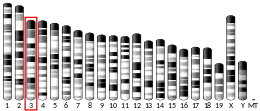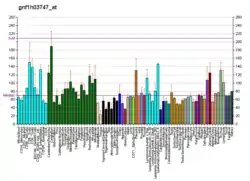GATAD2B
Transcriptional repressor p66-beta is a protein that in humans is encoded by the GATAD2B gene.[5][6][7]
Interactions
GATAD2B has been shown to interact with Methyl-CpG-binding domain protein 2,[6][8] MBD3,[6][8] RBBP7[6] and RBBP4.[6]
References
- ENSG00000261992 GRCh38: Ensembl release 89: ENSG00000143614, ENSG00000261992 - Ensembl, May 2017
- GRCm38: Ensembl release 89: ENSMUSG00000042390 - Ensembl, May 2017
- "Human PubMed Reference:". National Center for Biotechnology Information, U.S. National Library of Medicine.
- "Mouse PubMed Reference:". National Center for Biotechnology Information, U.S. National Library of Medicine.
- Hirosawa M, Nagase T, Ishikawa K, Kikuno R, Nomura N, Ohara O (Jan 2000). "Characterization of cDNA clones selected by the GeneMark analysis from size-fractionated cDNA libraries from human brain". DNA Res. 6 (5): 329–36. doi:10.1093/dnares/6.5.329. PMID 10574461.
- Feng Q, Cao R, Xia L, Erdjument-Bromage H, Tempst P, Zhang Y (Dec 2001). "Identification and functional characterization of the p66/p68 components of the MeCP1 complex". Mol Cell Biol. 22 (2): 536–46. doi:10.1128/MCB.22.2.536-546.2002. PMC 139742. PMID 11756549.
- "Entrez Gene: GATAD2B GATA zinc finger domain containing 2B".
- Brackertz, Marc; Boeke Joern; Zhang Ru; Renkawitz Rainer (Oct 2002). "Two highly related p66 proteins comprise a new family of potent transcriptional repressors interacting with MBD2 and MBD3". J. Biol. Chem. United States. 277 (43): 40958–66. doi:10.1074/jbc.M207467200. ISSN 0021-9258. PMID 12183469.
Further reading
- Brackertz M, Boeke J, Zhang R, Renkawitz R (2002). "Two highly related p66 proteins comprise a new family of potent transcriptional repressors interacting with MBD2 and MBD3". J. Biol. Chem. 277 (43): 40958–66. doi:10.1074/jbc.M207467200. PMID 12183469.
- Strausberg RL, Feingold EA, Grouse LH, et al. (2003). "Generation and initial analysis of more than 15,000 full-length human and mouse cDNA sequences". Proc. Natl. Acad. Sci. U.S.A. 99 (26): 16899–903. Bibcode:2002PNAS...9916899M. doi:10.1073/pnas.242603899. PMC 139241. PMID 12477932.
- Ota T, Suzuki Y, Nishikawa T, et al. (2004). "Complete sequencing and characterization of 21,243 full-length human cDNAs". Nat. Genet. 36 (1): 40–5. doi:10.1038/ng1285. PMID 14702039.
- Colland F, Jacq X, Trouplin V, et al. (2004). "Functional proteomics mapping of a human signaling pathway". Genome Res. 14 (7): 1324–32. doi:10.1101/gr.2334104. PMC 442148. PMID 15231748.
- Beausoleil SA, Jedrychowski M, Schwartz D, et al. (2004). "Large-scale characterization of HeLa cell nuclear phosphoproteins". Proc. Natl. Acad. Sci. U.S.A. 101 (33): 12130–5. Bibcode:2004PNAS..10112130B. doi:10.1073/pnas.0404720101. PMC 514446. PMID 15302935.
- Gerhard DS, Wagner L, Feingold EA, et al. (2004). "The status, quality, and expansion of the NIH full-length cDNA project: the Mammalian Gene Collection (MGC)". Genome Res. 14 (10B): 2121–7. doi:10.1101/gr.2596504. PMC 528928. PMID 15489334.
- Kimura K, Wakamatsu A, Suzuki Y, et al. (2006). "Diversification of transcriptional modulation: large-scale identification and characterization of putative alternative promoters of human genes". Genome Res. 16 (1): 55–65. doi:10.1101/gr.4039406. PMC 1356129. PMID 16344560.
- Brackertz M, Gong Z, Leers J, Renkawitz R (2006). "p66alpha and p66beta of the Mi-2/NuRD complex mediate MBD2 and histone interaction". Nucleic Acids Res. 34 (2): 397–406. doi:10.1093/nar/gkj437. PMC 1331983. PMID 16415179.
- Gregory SG, Barlow KF, McLay KE, et al. (2006). "The DNA sequence and biological annotation of human chromosome 1". Nature. 441 (7091): 315–21. Bibcode:2006Natur.441..315G. doi:10.1038/nature04727. PMID 16710414.
- Beausoleil SA, Villén J, Gerber SA, et al. (2006). "A probability-based approach for high-throughput protein phosphorylation analysis and site localization". Nat. Biotechnol. 24 (10): 1285–92. doi:10.1038/nbt1240. PMID 16964243. S2CID 14294292.
This article is issued from Wikipedia. The text is licensed under Creative Commons - Attribution - Sharealike. Additional terms may apply for the media files.




